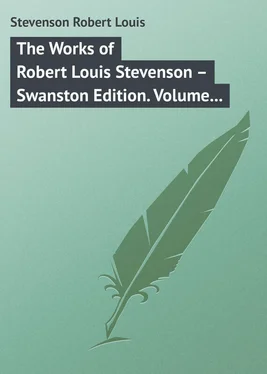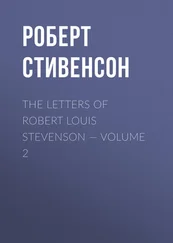Robert Stevenson - The Works of Robert Louis Stevenson – Swanston Edition. Volume 3
Здесь есть возможность читать онлайн «Robert Stevenson - The Works of Robert Louis Stevenson – Swanston Edition. Volume 3» — ознакомительный отрывок электронной книги совершенно бесплатно, а после прочтения отрывка купить полную версию. В некоторых случаях можно слушать аудио, скачать через торрент в формате fb2 и присутствует краткое содержание. Жанр: foreign_prose, на английском языке. Описание произведения, (предисловие) а так же отзывы посетителей доступны на портале библиотеки ЛибКат.
- Название:The Works of Robert Louis Stevenson – Swanston Edition. Volume 3
- Автор:
- Жанр:
- Год:неизвестен
- ISBN:нет данных
- Рейтинг книги:4 / 5. Голосов: 1
-
Избранное:Добавить в избранное
- Отзывы:
-
Ваша оценка:
- 80
- 1
- 2
- 3
- 4
- 5
The Works of Robert Louis Stevenson – Swanston Edition. Volume 3: краткое содержание, описание и аннотация
Предлагаем к чтению аннотацию, описание, краткое содержание или предисловие (зависит от того, что написал сам автор книги «The Works of Robert Louis Stevenson – Swanston Edition. Volume 3»). Если вы не нашли необходимую информацию о книге — напишите в комментариях, мы постараемся отыскать её.
The Works of Robert Louis Stevenson – Swanston Edition. Volume 3 — читать онлайн ознакомительный отрывок
Ниже представлен текст книги, разбитый по страницам. Система сохранения места последней прочитанной страницы, позволяет с удобством читать онлайн бесплатно книгу «The Works of Robert Louis Stevenson – Swanston Edition. Volume 3», без необходимости каждый раз заново искать на чём Вы остановились. Поставьте закладку, и сможете в любой момент перейти на страницу, на которой закончили чтение.
Интервал:
Закладка:
There is here a quality in the narration more intimate and particular than is general with Hugo; but it must be owned, on the other hand, that the book is wordy, and even, now and then, a little wearisome. Ursus and his wolf are pleasant enough companions; but the former is nearly as much an abstract type as the latter. There is a beginning, also, of an abuse of conventional conversation, such as may be quite pardonable in the drama where needs must, but is without excuse in the romance. Lastly, I suppose one must say a word or two about the weak points of this not immaculate novel; and if so, it will be best to distinguish at once. The large family of English blunders, to which we have alluded already in speaking of “Les Travailleurs,” are of a sort that is really indifferent in art. If Shakespeare makes his ships cast anchor by some seaport of Bohemia, if Hugo imagines Tom-Jim-Jack to be a likely nickname for an English sailor, or if either Shakespeare, or Hugo, or Scott, for that matter, be guilty of “figments enough to confuse the march of a whole history – anachronisms enough to overset all chronology,” 2 2 Prefatory letter to “Peveril of the Peak.”
the life of their creations, the artistic truth and accuracy of their work, is not so much as compromised. But when we come upon a passage like the sinking of the Ourque in this romance, we can do nothing but cover our face with our hands: the conscientious reader feels a sort of disgrace in the very reading. For such artistic falsehoods, springing from what I have called already an unprincipled avidity after effect, no amount of blame can be exaggerated; and above all, when the criminal is such a man as Victor Hugo. We cannot forgive in him what we might have passed over in a third-rate sensation novelist. Little as he seems to know of the sea and nautical affairs, he must have known very well that vessels do not go down as he makes the Ourque go down; he must have known that such a liberty with fact was against the laws of the game, and incompatible with all appearance of sincerity in conception or workmanship.
In each of these books, one after another, there has been some departure from the traditional canons of romance; but taking each separately, one would have feared to make too much of these departures, or to found any theory upon what was perhaps purely accidental. The appearance of “Quatrevingt-treize” has put us out of the region of such doubt. Like a doctor who has long been hesitating how to classify an epidemic malady, we have come at last upon a case so well marked that our uncertainty is at an end. It is a novel built upon “a sort of enigma,” which was at that date laid before revolutionary France, and which is presented by Hugo to Tellmarch, to Lantenac, to Gauvain, and very terribly to Cimourdain, each of whom gives his own solution of the question, clement or stern, according to the temper of his spirit. That enigma was this: “Can a good action be a bad action? Does not he who spares the wolf kill the sheep?” This question, as I say, meets with one answer after another during the course of the book, and yet seems to remain undecided to the end. And something in the same way, although one character, or one set of characters, after another comes to the front and occupies our attention for the moment, we never identify our interest with any of these temporary heroes nor regret them after they are withdrawn. We soon come to regard them somewhat as special cases of a general law; what we really care for is something that they only imply and body forth to us. We know how history continues through century after century; how this king or that patriot disappears from its pages with his whole generation, and yet we do not cease to read, nor do we even feel as if we had reached any legitimate conclusion, because our interest is not in the men, but in the country that they loved or hated, benefited or injured. And so it is here: Gauvain and Cimourdain pass away, and we regard them no more than the lost armies of which we find the cold statistics in military annals; what we regard is what remains behind; it is the principle that put these men where they were, that filled them for a while with heroic inspiration, and has the power, now that they are fallen, to inspire others with the same courage. The interest of the novel centres about revolutionary France: just as the plot is an abstract judicial difficulty, the hero is an abstract historical force. And this has been done, not, as it would have been before, by the cold and cumbersome machinery of allegory, but with bold, straightforward realism, dealing only with the objective materials of art, and dealing with them so masterfully that the palest abstractions of thought come before us, and move our hopes and fears, as if they were the young men and maidens of customary romance.
The episode of the mother and children in “Quatrevingt-treize” is equal to anything that Hugo has ever written. There is one chapter in the second volume, for instance, called “ Sein guéri, cœur saignant ,” that is full of the very stuff of true tragedy, and nothing could be more delightful than the humours of the three children on the day before the assault. The passage on La Vendée is really great, and the scenes in Paris have much of the same broad merit. The book is full, as usual, of pregnant and splendid sayings. But when thus much is conceded by way of praise, we come to the other scale of the balance, and find this, also, somewhat heavy. There is here a yet greater over-employment of conventional dialogue than in “L’Homme qui Rit“; and much that should have been said by the author himself, if it were to be said at all, he has most unwarrantably put into the mouths of one or other of his characters. We should like to know what becomes of the main body of the troop in the wood of La Saudraie during the thirty pages or so in which the foreguard lays aside all discipline, and stops to gossip over a woman and some children. We have an unpleasant idea forced upon us at one place, in spite of all the good-natured incredulity that we can summon up to resist it. Is it possible that Monsieur Hugo thinks they ceased to steer the corvette while the gun was loose? Of the chapter in which Lantenac and Halmalho are alone together in the boat, the less said the better; of course, if there were nothing else, they would have been swamped thirty times over during the course of Lantenac’s harangue. Again, after Lantenac has landed, we have scenes of almost inimitable workmanship that suggest the epithet “statuesque” by their clear and trenchant outline; but the tocsin scene will not do, and the tocsin unfortunately pervades the whole passage, ringing continually in our ears with a taunting accusation of falsehood. And then, when we come to the place where Lantenac meets the royalists, under the idea that he is going to meet the republicans, it seems as if there were a hitch in the stage mechanism. I have tried it over in every way, and I cannot conceive any disposition that would make the scene possible as narrated.
Such then, with their faults and their signal excellences, are the five great novels.
Romance is a language in which many persons learn to speak with a certain appearance of fluency; but there are few who can ever bend it to any practical need, few who can ever be said to express themselves in it. It has become abundantly plain in the foregoing examination that Victor Hugo occupies a high place among those few. He has always a perfect command over his stories; and we see that they are constructed with a high regard to some ulterior purpose, and that every situation is informed with moral significance and grandeur. Of no other man can the same thing be said in the same degree. His romances are not to be confused with “the novel with a purpose” as familiar to the English reader: this is generally the model of incompetence; and we see the moral clumsily forced into every hole and corner of the story, or thrown externally over it like a carpet over a railing. Now the moral significance, with Hugo, is of the essence of the romance; it is the organising principle. If you could somehow despoil “Les Misérables” or “Les Travailleurs” of their distinctive lesson, you would find that the story had lost its interest and the book was dead.
Читать дальшеИнтервал:
Закладка:
Похожие книги на «The Works of Robert Louis Stevenson – Swanston Edition. Volume 3»
Представляем Вашему вниманию похожие книги на «The Works of Robert Louis Stevenson – Swanston Edition. Volume 3» списком для выбора. Мы отобрали схожую по названию и смыслу литературу в надежде предоставить читателям больше вариантов отыскать новые, интересные, ещё непрочитанные произведения.
Обсуждение, отзывы о книге «The Works of Robert Louis Stevenson – Swanston Edition. Volume 3» и просто собственные мнения читателей. Оставьте ваши комментарии, напишите, что Вы думаете о произведении, его смысле или главных героях. Укажите что конкретно понравилось, а что нет, и почему Вы так считаете.










